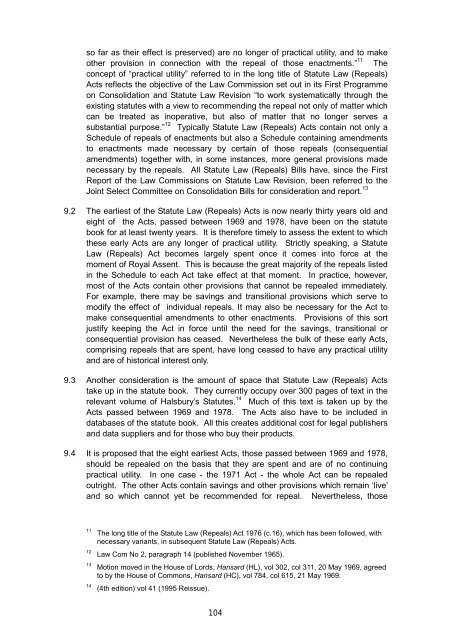STATUTE LAW REVISION: SIXTEENTH ... - Law Commission
STATUTE LAW REVISION: SIXTEENTH ... - Law Commission
STATUTE LAW REVISION: SIXTEENTH ... - Law Commission
You also want an ePaper? Increase the reach of your titles
YUMPU automatically turns print PDFs into web optimized ePapers that Google loves.
so far as their effect is preserved) are no longer of practical utility, and to make<br />
other provision in connection with the repeal of those enactments.” 11 The<br />
concept of “practical utility” referred to in the long title of Statute <strong>Law</strong> (Repeals)<br />
Acts reflects the objective of the <strong>Law</strong> <strong>Commission</strong> set out in its First Programme<br />
on Consolidation and Statute <strong>Law</strong> Revision “to work systematically through the<br />
existing statutes with a view to recommending the repeal not only of matter which<br />
can be treated as inoperative, but also of matter that no longer serves a<br />
substantial purpose.” 12 Typically Statute <strong>Law</strong> (Repeals) Acts contain not only a<br />
Schedule of repeals of enactments but also a Schedule containing amendments<br />
to enactments made necessary by certain of those repeals (consequential<br />
amendments) together with, in some instances, more general provisions made<br />
necessary by the repeals. All Statute <strong>Law</strong> (Repeals) Bills have, since the First<br />
Report of the <strong>Law</strong> <strong>Commission</strong>s on Statute <strong>Law</strong> Revision, been referred to the<br />
Joint Select Committee on Consolidation Bills for consideration and report. 13<br />
9.2 The earliest of the Statute <strong>Law</strong> (Repeals) Acts is now nearly thirty years old and<br />
eight of the Acts, passed between 1969 and 1978, have been on the statute<br />
book for at least twenty years. It is therefore timely to assess the extent to which<br />
these early Acts are any longer of practical utility. Strictly speaking, a Statute<br />
<strong>Law</strong> (Repeals) Act becomes largely spent once it comes into force at the<br />
moment of Royal Assent. This is because the great majority of the repeals listed<br />
in the Schedule to each Act take effect at that moment. In practice, however,<br />
most of the Acts contain other provisions that cannot be repealed immediately.<br />
For example, there may be savings and transitional provisions which serve to<br />
modify the effect of individual repeals. It may also be necessary for the Act to<br />
make consequential amendments to other enactments. Provisions of this sort<br />
justify keeping the Act in force until the need for the savings, transitional or<br />
consequential provision has ceased. Nevertheless the bulk of these early Acts,<br />
comprising repeals that are spent, have long ceased to have any practical utility<br />
and are of historical interest only.<br />
9.3 Another consideration is the amount of space that Statute <strong>Law</strong> (Repeals) Acts<br />
take up in the statute book. They currently occupy over 300 pages of text in the<br />
relevant volume of Halsbury’s Statutes. 14 Much of this text is taken up by the<br />
Acts passed between 1969 and 1978. The Acts also have to be included in<br />
databases of the statute book. All this creates additional cost for legal publishers<br />
and data suppliers and for those who buy their products.<br />
9.4 It is proposed that the eight earliest Acts, those passed between 1969 and 1978,<br />
should be repealed on the basis that they are spent and are of no continuing<br />
practical utility. In one case - the 1971 Act - the whole Act can be repealed<br />
outright. The other Acts contain savings and other provisions which remain ‘live’<br />
and so which cannot yet be recommended for repeal. Nevertheless, those<br />
11 The long title of the Statute <strong>Law</strong> (Repeals) Act 1976 (c.16), which has been followed, with<br />
necessary variants, in subsequent Statute <strong>Law</strong> (Repeals) Acts.<br />
12 <strong>Law</strong> Com No 2, paragraph 14 (published November 1965).<br />
13 Motion moved in the House of Lords, Hansard (HL), vol 302, col 311, 20 May 1969, agreed<br />
to by the House of Commons, Hansard (HC), vol 784, col 615, 21 May 1969.<br />
14 (4th edition) vol 41 (1995 Reissue).<br />
104

















